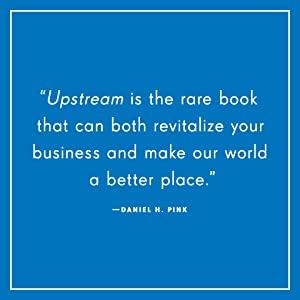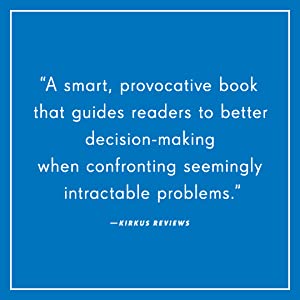

Format Hardback | 320 pages
Dimensions 137 x 216 x 30mm | 408g
Publication date 03 Mar 2020
Publisher Avid Reader Press / Simon & Schuster
Language English
Illustrations note Illustrations, unspecified
ISBN10 1982134720
ISBN13 9781982134723
頁面參數僅供參考,具體以實物為準


紐約時報暢銷作家、《行為設計學:掌控關鍵決策》《讓創意更有黏性:創意直抵人心的六條路徑》作者丹·希思告訴你:想真正解決棘手問題?「事前預防」*更勝於「事後補救」!
在生活中,人們總是經常陷入反應的循環之中,往往都是站在末端應對突如其來發生的問題,卻從沒有從首端解決發生問題的系統。警察追趕壞人、醫生為患有慢性疾病的病人提供治療、客服中心總是對客户的投訴應接不暇。可是有許多的犯罪問題、慢性疾病與客户投訴都是可以事先預防的,為何我們總是努力於位居末端反應而非預防?
《紐約時報》暢銷書作者Dan Heath與解決非常規問題的人們訪談了數百次,得出了在問題發生之前如何預防問題本身的獨特見解。Dan Heath認為這一切的成因都歸於「問題盲目性」,因為這可能讓我們無視於中間存在的嚴重問題。透過作者讓我們瞭解到,世界上是有人克服了障礙,經由從上調整系統模式,並讓整體都得到了即刻的改變。Expedia(一個大型旅行網站)將預定系統進行了一些簡單的調整,每年就避免了2000萬個客服問題;一個城市學區在得知可以預測哪些學生將會輟學後,將輟學率降低了一半;一個歐洲國家透過改變該國文化,幾乎消除了青少年酗酒和吸毒的現象;一個緊急醫療服務系統通過使用數據來預測哪裏會出現911報警電話,從而加快了救護車的緊急響應時間,並進一步部署救護車在這些地區待命。
New York Times best-selling author Dan Heath explores how to prevent problems before they happen, drawing on insights from hundreds of interviews with unconventional problem solvers.
So often in life, we get stuck in a cycle of response. We put out fires. We deal with emergencies. We stay downstream, handling one problem after another, but we never make our way upstream to fix the systems that caused the problems. Cops chase robbers, doctors treat patients with chronic illnesses, and call-center reps address customer complaints. But many crimes, chronic illnesses, and customer complaints are preventable. So why do our efforts skew so heavily toward reaction rather than prevention?
Upstream probes the psychological forces that push us downstream - including "problem blindness," which can leave us oblivious to serious problems in our midst. And Heath introduces us to the thinkers who have overcome these obstacles and scored massive victories by switching to an upstream mindset. One online travel website prevented 20 million customer service calls every year by making some simple tweaks to its booking system. A major urban school district cut its dropout rate in half after it figured out that it could predict which students would drop out - as early as the ninth grade. A European nation almost eliminated teenage alcohol and drug abuse by deliberately changing the nation's culture. And one EMS system accelerated the emergency-response time of its ambulances by using data to predict where 911 calls would emerge - and forward-deploying its ambulances to stand by in those areas.
Upstream delivers practical solutions for preventing problems rather than reacting to them. How many problems in our lives and in society are we tolerating simply because we've forgotten that we can fix them?




“Upstream draws on examples from across the spectrum, from sport to business. But Heath is clever enough to focus on significant societal issues, such as sexual harassment, climate change, and school shootings, which gives the book a substantial feel that some more superficial problem-solving manuals lack.” —Financial Times, Best Book of the Month
“[An] elegant manifesto . . . With the frenetic pace of modern life, Heath observes, it’s easy to become accustomed to putting out fires instead of looking for the spark that’s igniting them. . . . This is a pragmatic guide for those seeking big changes on either an individual or organizational level.” —Publishers Weekly
“Heath presents a convincing argument for shifting resources ‘upstream’ and focusing on prevention rather than cure.” —Booklist

“The most interesting, immediately actionable book I’ve read in quite a while. I walked away with new ideas for motivating employees, delighting customers, engaging students, and even planning family vacations. If life is a series of moments, the Heath brothers have transformed how I plan to spend mine.”—Adam Grant, New York Times bestselling author of Give and Take, Originals, and Option B with Sheryl Sandberg

一旦問題發生,下游行動就會做出反應。上游的努力旨在防止這些問題的發生。
當我們看不到問題時,就無法解決。
從問題盲目中逃脱始於對震驚的認識,即您已將異常視作正常情況……改善的種子是不滿意。
如果他們做得對,上游會議就會充滿活力:富有創造力,誠實和即興發揮,伴隨着為實現有意義的目標而共同奮鬥而產生的那種友情。
改變制度就是改變統治我們的規則或影響我們的文化。
問題的驗屍可以作為解決方案的序言。
當一切都引起警報時,什麼也沒有引起警報。
上游工作取決於謙卑。
…當問題發生並得到解決後,積極的努力就會成功。什麼也沒有發生,預防工作就會成功。
當艱苦並沒有迫使他們進行協作時,很難説服人們進行協作。


丹·希思(Dan Heath),杜克大學社會企業發展中心高級研究員,前哈佛商學院研究員,Thinkwell(思睿)新媒體教育公司創辦人之一。
丹·希思和他的兄弟奇普已經寫了4本《紐約時報》暢銷書:《讓創意更有黏性 : 創意直抵人心的六條路徑》、《行為設計學》、《決斷力 : 如何在生活與工作中做出更好的選擇》和《瞬變 : 讓改變輕鬆起來的9個方法》。
希斯兄弟的書在全球售出了300多萬冊,並被翻譯成33種語言。
Dan Heath and his brother, Chip, have written four New York Times bestselling books: Made to Stick, Switch, Decisive, and The Power of Moments. Heath is a senior fellow at Duke University’s CASE center, which supports entrepreneurs fighting for social good. He lives in Durham, North Carolina. The Heath brothers’ books have sold more than three million copies worldwide and have been translated into thirty-three languages.


Format Hardback | 320 pages
Dimensions 137 x 216 x 30mm | 408g
Publication date 03 Mar 2020
Publisher Avid Reader Press / Simon & Schuster
Language English
Illustrations note Illustrations, unspecified
ISBN10 1982134720
ISBN13 9781982134723
頁面參數僅供參考,具體以實物為準


紐約時報暢銷作家、《行為設計學:掌控關鍵決策》《讓創意更有黏性:創意直抵人心的六條路徑》作者丹·希思告訴你:想真正解決棘手問題?「事前預防」*更勝於「事後補救」!
在生活中,人們總是經常陷入反應的循環之中,往往都是站在末端應對突如其來發生的問題,卻從沒有從首端解決發生問題的系統。警察追趕壞人、醫生為患有慢性疾病的病人提供治療、客服中心總是對客户的投訴應接不暇。可是有許多的犯罪問題、慢性疾病與客户投訴都是可以事先預防的,為何我們總是努力於位居末端反應而非預防?
《紐約時報》暢銷書作者Dan Heath與解決非常規問題的人們訪談了數百次,得出了在問題發生之前如何預防問題本身的獨特見解。Dan Heath認為這一切的成因都歸於「問題盲目性」,因為這可能讓我們無視於中間存在的嚴重問題。透過作者讓我們瞭解到,世界上是有人克服了障礙,經由從上調整系統模式,並讓整體都得到了即刻的改變。Expedia(一個大型旅行網站)將預定系統進行了一些簡單的調整,每年就避免了2000萬個客服問題;一個城市學區在得知可以預測哪些學生將會輟學後,將輟學率降低了一半;一個歐洲國家透過改變該國文化,幾乎消除了青少年酗酒和吸毒的現象;一個緊急醫療服務系統通過使用數據來預測哪裏會出現911報警電話,從而加快了救護車的緊急響應時間,並進一步部署救護車在這些地區待命。
New York Times best-selling author Dan Heath explores how to prevent problems before they happen, drawing on insights from hundreds of interviews with unconventional problem solvers.
So often in life, we get stuck in a cycle of response. We put out fires. We deal with emergencies. We stay downstream, handling one problem after another, but we never make our way upstream to fix the systems that caused the problems. Cops chase robbers, doctors treat patients with chronic illnesses, and call-center reps address customer complaints. But many crimes, chronic illnesses, and customer complaints are preventable. So why do our efforts skew so heavily toward reaction rather than prevention?
Upstream probes the psychological forces that push us downstream - including "problem blindness," which can leave us oblivious to serious problems in our midst. And Heath introduces us to the thinkers who have overcome these obstacles and scored massive victories by switching to an upstream mindset. One online travel website prevented 20 million customer service calls every year by making some simple tweaks to its booking system. A major urban school district cut its dropout rate in half after it figured out that it could predict which students would drop out - as early as the ninth grade. A European nation almost eliminated teenage alcohol and drug abuse by deliberately changing the nation's culture. And one EMS system accelerated the emergency-response time of its ambulances by using data to predict where 911 calls would emerge - and forward-deploying its ambulances to stand by in those areas.
Upstream delivers practical solutions for preventing problems rather than reacting to them. How many problems in our lives and in society are we tolerating simply because we've forgotten that we can fix them?




“Upstream draws on examples from across the spectrum, from sport to business. But Heath is clever enough to focus on significant societal issues, such as sexual harassment, climate change, and school shootings, which gives the book a substantial feel that some more superficial problem-solving manuals lack.” —Financial Times, Best Book of the Month
“[An] elegant manifesto . . . With the frenetic pace of modern life, Heath observes, it’s easy to become accustomed to putting out fires instead of looking for the spark that’s igniting them. . . . This is a pragmatic guide for those seeking big changes on either an individual or organizational level.” —Publishers Weekly
“Heath presents a convincing argument for shifting resources ‘upstream’ and focusing on prevention rather than cure.” —Booklist

"I read this cover to cover and learned something new on each page. Beautifully written, brilliantly researched—I'm recommending it to everyone I know!"—Angela Duckworth, New York Times bestselling author of Grit
“The most interesting, immediately actionable book I’ve read in quite a while. I walked away with new ideas for motivating employees, delighting customers, engaging students, and even planning family vacations. If life is a series of moments, the Heath brothers have transformed how I plan to spend mine.”—Adam Grant, New York Times bestselling author of Give and Take, Originals, and Option B with Sheryl Sandberg

一旦問題發生,下游行動就會做出反應。上游的努力旨在防止這些問題的發生。
當我們看不到問題時,就無法解決。
從問題盲目中逃脱始於對震驚的認識,即您已將異常視作正常情況……改善的種子是不滿意。
如果他們做得對,上游會議就會充滿活力:富有創造力,誠實和即興發揮,伴隨着為實現有意義的目標而共同奮鬥而產生的那種友情。
改變制度就是改變統治我們的規則或影響我們的文化。
問題的驗屍可以作為解決方案的序言。
當一切都引起警報時,什麼也沒有引起警報。
上游工作取決於謙卑。
…當問題發生並得到解決後,積極的努力就會成功。什麼也沒有發生,預防工作就會成功。
當艱苦並沒有迫使他們進行協作時,很難説服人們進行協作。


丹·希思(Dan Heath),杜克大學社會企業發展中心高級研究員,前哈佛商學院研究員,Thinkwell(思睿)新媒體教育公司創辦人之一。
丹·希思和他的兄弟奇普已經寫了4本《紐約時報》暢銷書:《讓創意更有黏性 : 創意直抵人心的六條路徑》、《行為設計學》、《決斷力 : 如何在生活與工作中做出更好的選擇》和《瞬變 : 讓改變輕鬆起來的9個方法》。
希斯兄弟的書在全球售出了300多萬冊,並被翻譯成33種語言。
Dan Heath and his brother, Chip, have written four New York Times bestselling books: Made to Stick, Switch, Decisive, and The Power of Moments. Heath is a senior fellow at Duke University’s CASE center, which supports entrepreneurs fighting for social good. He lives in Durham, North Carolina. The Heath brothers’ books have sold more than three million copies worldwide and have been translated into thirty-three languages.
評論曬單